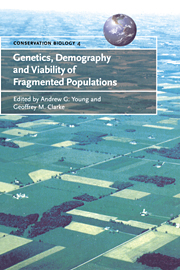Book contents
- Frontmatter
- Contents
- List of contributors
- Foreword by Peter F. Brussard
- Preface
- 1 Introduction: genetics, demography and the conservation of fragmented populations
- Part I Introductory concepts
- Part II Animal case studies
- 8 Inbreeding in small populations of red-cockaded woodpeckers: insights from a spatially explicit individual-based model
- 9 Genetic erosion in isolated small-mammal populations following rainforest fragmentation
- 10 The Tumut experiment – integrating demographic and genetic studies to unravel fragmentation effects: a case study of the native bush rat
- 11 Demographic evidence of inbreeding depression in wild golden lion tamarins
- 12 Inferring demography from genetics: a case study of the endangered golden sun moth, Synemon plana
- 13 Genetic population structure in desert bighorn sheep: implications for conservation in Arizona
- Part III Plant case studies
- References
- Index
10 - The Tumut experiment – integrating demographic and genetic studies to unravel fragmentation effects: a case study of the native bush rat
Published online by Cambridge University Press: 29 January 2010
- Frontmatter
- Contents
- List of contributors
- Foreword by Peter F. Brussard
- Preface
- 1 Introduction: genetics, demography and the conservation of fragmented populations
- Part I Introductory concepts
- Part II Animal case studies
- 8 Inbreeding in small populations of red-cockaded woodpeckers: insights from a spatially explicit individual-based model
- 9 Genetic erosion in isolated small-mammal populations following rainforest fragmentation
- 10 The Tumut experiment – integrating demographic and genetic studies to unravel fragmentation effects: a case study of the native bush rat
- 11 Demographic evidence of inbreeding depression in wild golden lion tamarins
- 12 Inferring demography from genetics: a case study of the endangered golden sun moth, Synemon plana
- 13 Genetic population structure in desert bighorn sheep: implications for conservation in Arizona
- Part III Plant case studies
- References
- Index
Summary
ABSTRACT
This paper describes preliminary results of integrated demographic and genetic studies of the bush rat (Rattus fuscipes) that are being conducted as part of the Tumut fragmentation experiment in southern New South Wales, south-eastern Australia. The experiment is focused on assessing habitat fragmentation and landscape-scale context effects through examining the response of vertebrates to three broad types of sites: sites in remnant patches of native eucalypt forest of different size and shape and embedded within extensive stands of radiata pine (Pinus radiata) plantation, sites in large contiguous areas of native eucalypt forest, and sites in stands of radiata pine.
Extensive field-based demographic studies using trapping and hairtubing field techniques showed that the bush rat was virtually absent from exotic softwood stands. Strong positive relationships also were observed between the area of remnants and the probability of patch occupancy by the species; small patches were significantly more likely to be unoccupied.
We examined genetic variation within and among three pairs of populations in remnant patches (0.5 to 1 km apart), and three populations from continuous forest. Using six microsatellite loci we found considerable genetic variation with a total of 55 different alleles detected in the study of 145 individuals. The number of alleles detected per population was correlated with sample size and varied from 27 to 42. The mean expected heterozygosity across all populations and loci was 0.71. Significant genetic differentiation across populations was detected by analysis of molecular variance (FST = 0.044, P < 0.0001). However, this relatively low average obscured considerable variation at the population-by-population level, with pairwise FST values varying from zero to 0.13.
- Type
- Chapter
- Information
- Genetics, Demography and Viability of Fragmented Populations , pp. 173 - 202Publisher: Cambridge University PressPrint publication year: 2000
- 21
- Cited by



